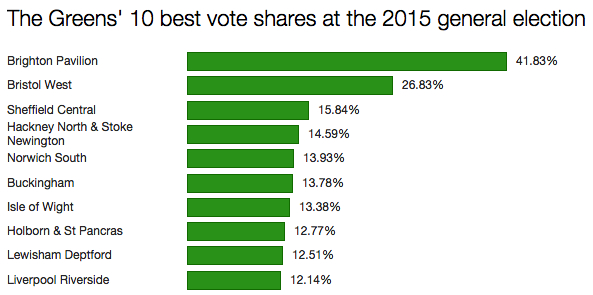Election results
Where next for Ukip and the Greens?
Both Ukip and the Green party emerged from the general election with one MP each: an outcome that has temporarily united them in support for a reform of the voting system.
While the result was no surprise as far as the Greens are concerned, I thought Ukip would do a tiny bit better and end up with at least two MPs. Instead the party went backwards, holding Clacton but losing Rochester & Strood (and doing so by a margin of 13.6 percentage points).
There is not going to be electoral reform any time soon – maybe not for a generation – so both Ukip and the Greens are going to have to find a different way of working the system to their favour.
Clacton aside, Ukip managed to poll more than a third of the vote in just one other seat: Boston & Skegness. It scored more than 30% in a total of eight seats, four of which were won by the Conservatives and three by Labour.
Of the seats listed in this graph, Ukip came first in one, second in 15 and third in four.
The party tended to perform best against the Conservatives in south-east England and best against Labour in north-east England and Yorkshire & Humberside.
But it got under 10% of the vote in almost every London constituency and in every Scottish seat (although it only fielded candidates in around half of Scotland’s 59 seats).
I don’t think any of Ukip’s achievements in parliamentary elections so far can be called significant. What would be significant would be a victory in a seat by someone who had not previously defected from another party. I’ll be fascinated to see how the party fares in the first by-election of this parliament.
The Greens came second in two seats: Bristol West and Sheffield Central. They also came within 0.1 percentage points of coming second in Hackney North & Stoke Newington.
On current boundaries, the party needs a swing of 4.4% to take Bristol West from Labour. This has to be their best chance of gaining a second MP in 2020, especially if the party can frame the contest as solely one between the mainstream and a plausible alternative.
But five years is an awfully long way away and it’s hard to imagine precisely what the political climate could be like in 2020. A United Kingdom outside the European Union, or in the EU but minus Scotland? A Conservative government fighting for re-election under the leadership of Theresa May or Boris Johnson? A Labour party trying to win from the centre ground in England and an entirely separate breakaway Scottish Labour party taking on the SNP in Scotland? A Liberal Democrat resurgence in south-west England?
It’s almost impossible to predict. But given what happened at this election, I wouldn’t want to try.


I would expect UKIP to pick up a couple of seats in by elections this parliament but none for the Greens.
UKIP Greens LDs SNP & PC all support PR and it is not going to happen soon. However as after GE2015 FPTP does not favour Labour as much as it did before, I think it is possible if Labour loses in GE2020 then they might favour PR before 2025.
It depends where the by-elections are and what causes them. It would probably have to be a seat where UKIP are a good second, and where the incumbent has resigned due to scandal.
It will also depend on whether UKIP have permanently usurped the traditional LD role of being the party of protest in by-elections. If they have, that will keep it in the public eye and could win them a few unexpected by-election victories. So we’ll need a few by-elections to see if that’s the case.
I wouldn’t rule out a UKIP mid-term by-election gain but by-elections are luck of the draw things. I believe 2015 marks ‘peak-UKIP’ in general elections. By the next election, the EU referendum will have been held and, on either result, UKIP will lose it raison d’etre.
Did the SNP lose their raison d’etre after the independence referendum? I would argue that UKIP would only lose their raison d’etre if the yes vote won… and as long as UKIP are around toxifying the anti-EU cause I doubt that will ever happen.
I assume from your context that by ‘yes vote’ you mean a vote to leave the EU. I very much doubt the referendum question will be framed that way!
If there is a vote to stay in, I think the vast majority of people – whichever way they voted – will regard the issue as settled for a generation. UKIP will retain its hard-core support but, as a major party, it will be on a downward glide path as its older, whiter supporters die off and younger and more ethnically diverse voters join the rolls.
I really don’t see a lot of parallels between the SNP and UKIP. Independence has been a live issue in Scotland for generations and will remain so. EU membership was a settled matter between 1975 and the early 90s. And UKIP’s rise only happened when EU immigration became a major issue in the last 10 years. I expect a referendum on EU membership to put the subject to bed in a way the Scottish referendum never could.